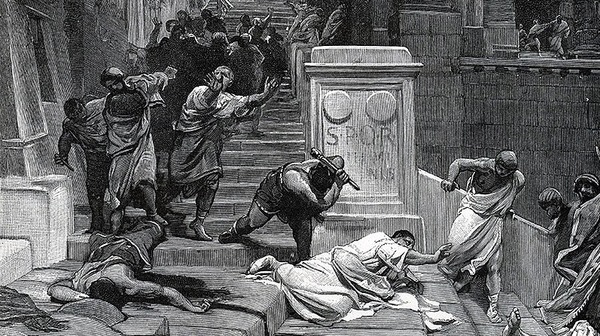
–>
April 7, 2023
Donald Trump’s indictment makes one wonder if the members of the Democrat party have ever picked up a history book, walked by one in a library, or accidentally heard an episode of the History of Rome podcast. I doubt it because if they had, they’d know that Rome didn’t transition from a republic to an empire overnight, and they’d be familiar with the modern iteration of the George Santayana adage: Those who do not learn history are doomed to repeat it.
‘); googletag.cmd.push(function () { googletag.display(‘div-gpt-ad-1609268089992-0’); }); }
By the time Caesar became dictator in 49 BC, the Republic was already gone in everything but name only. The Republic’s collapse had been put in motion 80 years before with the murder of Tiberius Gracchus.
Gracchus was a populist Plebeian tribune, essentially the equivalent of being a member of our House of Representatives. Citizens loved him, and the aristocratic Senate hated him. His assassination points the way to Caesar:
[T]he oligarchy had introduced violence into the political system with the murder of Tiberius Gracchus and over the years the use of violence became increasingly acceptable as various political disputes in Rome led to more and more bloody discord.
‘); googletag.cmd.push(function () { googletag.display(‘div-gpt-ad-1609270365559-0’); }); }
With Gracchus’s death, violence became an increasingly common political weapon in Rome, with Sulla’s purges early in the 1st century BC as the clearest example. Sulla executed 9,000 rival Marian partisan supporters, without regard for age or sex.

Image: The murder of Tiberius Garcchus. Public domain.
Three decades later, Caesar would take control, only to lose his life at the hands of a cabal of his establishment rivals. This widespread political violence only came to an end (temporary as it might be) when his adopted son, Augustus, become emperor. Tellingly, however, Augustus achieved that peace only after executing thousands of his political enemies.
Rome devolved from a republic in which domestic politics were decided mostly by words and relatively objective laws, to a dictatorship where laws were anything but objective, and the emperor could take life and property on a whim.
The late Roman Republic had the equivalent of our “Swamp,” which it called the Senate. While ostensibly there were balancing powers of influence, such as the assemblies, two Consuls (a split executive office with a term of one year) and, occasionally, the appointment of a temporary Dictator, the reality is that the Senate, made up of the richest and most powerful citizens, ran the Republic. Even when one of the assemblies or one of the Consuls seemed to be ascendant, it was the senators calling most of the shots through their relationships with the state officials, familial connections to this or that general, and their control of the purse strings.
So, you have a body of rich and powerful citizens having ostensibly limited power through the visible levers of government, but actually exercising real power through the connections, relationships, and shared ideology of the apparatchiks in the bureaucracy, the opinion makers, and those who indoctrinate the youth who always act as the frontline shock troops. Sound familiar?
Things have changed a lot in 2,000 years, but the nature of man…not so much. Power corrupts, and absolute power corrupts absolutely. As with most things today, political changes happen faster than they did in the past.
‘); googletag.cmd.push(function () { googletag.display(‘div-gpt-ad-1609268078422-0’); }); } if (publir_show_ads) { document.write(“
It took 100 years—from Gracchus’s emergence on the Roman stage until Augustus’s ascendance—for Rome to transform from a republic to an empire. It has taken less than 20 years since Barack Obama promised to “fundamentally transform” America for the country to change from a functioning but imperfect republic into a farce of a country characterized by a banana-republic-level tyranny.
With a complicit bureaucracy, Obama used the IRS to target political opponents, the Justice Department to coerce banks into blacklisting businesses he didn’t like, and Obamacare to give government unprecedented control over Americans’ health decisions while doubling the cost. He unconstitutionally opened the immigration spigot that has now become a torrent.
Within six months of taking office, Obama would set the tone for an administration that would set race relations back 50 years. His “evolution“ on gay marriage would give cover to the spineless Supreme Court to impose that travesty on the country and lay the ground for the fascist LBTQ hellscape America endures today. And finally, he weakened two of the most foundational elements of American society: The military and residential communities.
Obama set in motion a new set of rules in America, and Trump’s indictment, the Soviet-style attack on J6 attendees, and the prosecution of Douglass Mackey combine to demonstrate exactly what those new rules are: Thou shalt not oppose the Democrat party, thou shalt not speak badly of or mock the Democrat party or its minions, thou shalt not push back against the regulatory state, and thou shalt not express traditional American values.
These sham “prosecutions” are really persecution. They are nothing more than the Democrats’ regulatory state wrapping itself around American citizens’ necks like the Burmese Pythons killing most native species in the Everglades. The indictment of a former president and current presidential candidate on such a weak and preposterous theory as this one puts the lie to the idea that the Constitution limits our government. This is nothing less than the established “swamp” inventing new legal theories while ignoring existing law to crush a political opponent. That foretells the end of the Republic.
Our Republic has survived for 230 years because most Americans believe in our Constitution and respect the laws that emanate from it. But the Constitution is nothing more than a piece of paper… it’s not a gun, it’s not an army, it’s not police state stormtroopers. It’s a piece of paper that states how the government should operate, limits that government’s power, and guarantees the citizens’ various inherent liberties and freedoms.
For most of our history, the Constitution’s words guided how our nation operated. Citizens had two ways to change the way the country was governed: voting and amending the Constitution. Today, however, neither works. The former has been undermined by a Democrat party that steals elections under the cover of night and calls you a conspiracy nut when you notice. The latter isn’t even a consideration because the Democrat party and the apparatchiks running the regulatory and security states are no longer constrained by its words.
America has become a tyranny where the people in power no longer feel the need to seek validation from the citizens. They decide on the outcome and manipulate the numbers to produce the result without even a fig leaf hiding their disdain for citizens. Whether it was Bernie Sanders in 2016, Donald Trump in 2020, or Kari Lake in 2022, the Democrat party and its entrenched government comrades have decided they no longer need to subject themselves to the will of the citizenry and, if anyone objects, they use the judiciary to crush that person.
America has been loosed from the anchor of the Constitution and the rule of law that kept our citizens free for two centuries. While the blood of the regime’s enemies may not yet be flowing in the streets, history very clearly tells us that, unless we change what’s happening, it will be. The question is, are there enough Americans who are familiar with history and willing to pull us out of our national death spiral before that terrible end is upon us? How Americans respond to Donald Trump’s persecution is the canary in the coal mine that will likely answer that question.
You can follow Vince on Twitter at ImperfectUSA.
<!– if(page_width_onload <= 479) { document.write("
“); googletag.cmd.push(function() { googletag.display(‘div-gpt-ad-1345489840937-4’); }); } –> If you experience technical problems, please write to [email protected]
FOLLOW US ON
<!–
–>
<!– _qoptions={ qacct:”p-9bKF-NgTuSFM6″ }; ![]() –> <!—-> <!– var addthis_share = { email_template: “new_template” } –>
–> <!—-> <!– var addthis_share = { email_template: “new_template” } –>





